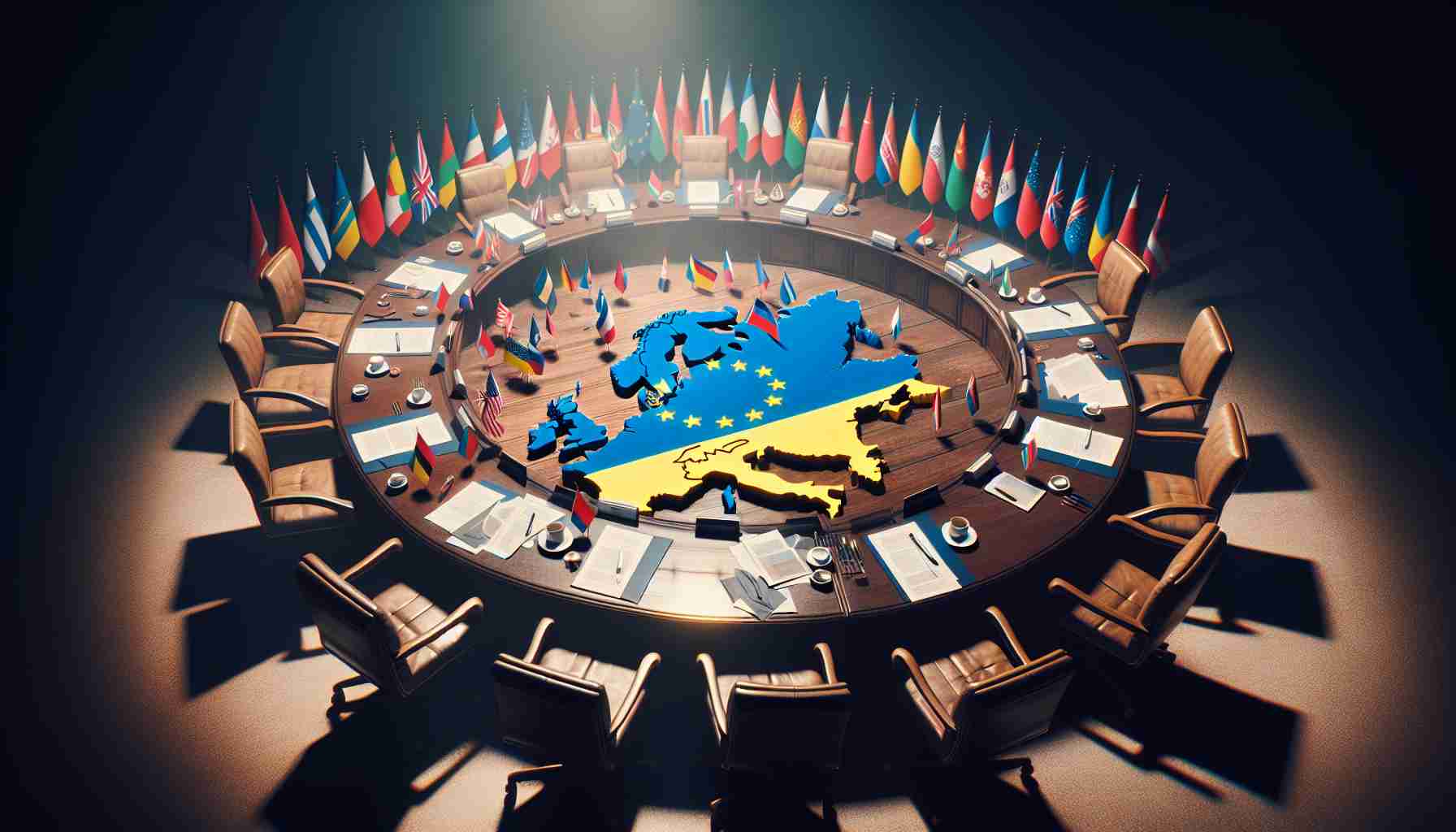- European leaders are urgently convening in Paris amid growing diplomatic tensions involving the US and Russia over Ukraine.
- There is concern that Europe may become a bystander as negotiations between Donald Trump and Vladimir Putin progress, potentially relegating European influence.
- The negotiations are poised to occur on Saudi Arabian soil, highlighting Europe’s peripheral status in these critical discussions.
- Allies of Ukraine seek to remain influential, yet face challenges due to Trump’s unpredictable strategic maneuvers.
- Experts urge greater European unity and decisive action, warning that inaction may lead to missed opportunities in shaping peace talks.
- The geopolitical scenario presents a crucial moment for Europe to assert leadership to avoid becoming irrelevant in international affairs concerning Ukraine.
An uneasy tide churns beneath the cloak of European diplomacy. As hastily summoned leaders gather in Paris, the ticking clock of international discussions grows ever louder. The world watches with bated breath as the anticipation of negotiations between Donald Trump and Vladimir Putin tightens the noose on the European corridor, revealing the unsettling truth—without swift, decisive actions, the continent risks relegation to mere bystanders in the outcome of the Ukrainian conflict.
Under the looming shadow of a potential Russia-US accord to be brokered on Saudi Arabian soil, European leaders scramble for relevance. The choice of venue—a land far removed from the epicenter of European governance—serves as a stark reminder that history, indeed, can be rewritten far from where it is lived.
Amid this diplomatic whirlwind, the urgency grows palpable. Allies of Ukraine aim to reinvent strategies to remain not just an echo in these conversations but a voice of consequence. Their optimism falters, seemingly unprepared for the parlay fast-tracking across the Atlantic, where Trump’s unpredictability has morphed into strategic maneuvering prioritized explicitly over lingering alliances.
Experts express surprise mixed with skepticism. Many say the time to prepare was yesterday, that a greater show of European unity is needed—not characterized by complacency but by a willingness to lead, not follow. Yet, the window narrows as uncertainties multiply.
As the geopolitical tapestry unfolds, only one clear imperative remains for Europe: act decisively, talk with unity, and do not wait for invitations to shape the dialogue of peace. The stakes are too high, the risks too steep, and the outcomes could set precedents for a generation. The future of Europe’s involvement teeters, reliant on whether leaders will seize control or simply watch it slip away.
European Diplomatic Drama: How to Navigate the High-Stakes Geopolitical Chess Game
How-To Steps & Life Hacks
1. Stay Informed: To effectively participate in or understand international discussions such as those between Trump and Putin, ensure you’re up-to-date with credible news sources. Consider using platforms like BBC or Reuters.
2. Engage in Discussions: Engaging in dialogues, whether in academic, professional, or social settings, can help reinforce your understanding of geopolitical dynamics.
3. Cultivate Critical Thinking: Analyze different perspectives presented by various geopolitical commentators and experts. This can provide a multi-faceted view of the situation.
4. Network with Experts: Join forums or attend webinars and conferences where geopolitical issues are discussed. LinkedIn or professional organizations often list such events.
Real-World Use Cases
The significance of effective diplomacy extends to international trade, security alliances (like NATO), and global economic stability. A robust European diplomatic front could influence outcomes positively in these arenas.
Market Forecasts & Industry Trends
The current geopolitical climate influences market dynamics by affecting energy prices, stock markets, and foreign exchange. Industry trends indicate a pivot to renewable energy, less reliance on Russian oil and gas, and increased investment in European defense industries.
Reviews & Comparisons
In comparing diplomacy tactics, the current European strategy may seem fragmented compared to the more centralized negotiation style of the U.S. or Russia. This highlights the importance of unity in policy and decision-making within the EU for a stronger diplomatic presence.
Controversies & Limitations
Geopolitical negotiations, especially those involving unpredictable elements like the Trump administration and Russia, often lack transparency, leading to controversies. Limitations of current European diplomacy include bureaucratic inertia and competing national interests among member states.
Features, Specs & Pricing
When considering diplomatic strategies, one could analyze the “features” such as negotiation skills, multilingual capabilities, historical alliances, and economic leverage (foreign aid and sanctions).
Security & Sustainability
A unified European stance is crucial for regional security, especially concerning NATO’s role in deterrence. Sustainable diplomatic efforts should aim for long-term peace through consistent policies and support of Ukraine’s sovereignty.
Insights & Predictions
– Prediction 1: Without decisive European intervention, Russia and the U.S. will dominate the outcome of negotiations related to Ukraine, potentially sidelining European influence.
– Prediction 2: A fortified EU diplomatic approach could bolster Europe’s geopolitical clout, necessitating increased defense collaboration and unified policy-making.
Pros & Cons Overview
– Pros: A more proactive European approach could lead to stronger international alliances, improved regional security, and a boost in economic stability.
– Cons: Risk of escalating tensions if not strategically managed; potential internal discord among EU nations over differing priorities.
Actionable Recommendations
1. Strengthen Alliances: Europe should focus on reinforcing ties with both U.S. allies and other global partners, fostering a multi-aligned strategy.
2. Prioritize Unity: EU should emphasize common goals and policies to present a unified front in international negotiations.
3. Invest in Capabilities: Increase investment in diplomatic training and resources to enhance Europe’s negotiation readiness.
4. Public Engagement: Encourage a public understanding of foreign policy to gain broader support for diplomatic initiatives.
For a comprehensive understanding of these dynamics, the European Union’s official website offers detailed insights into policy decisions: European Union.
